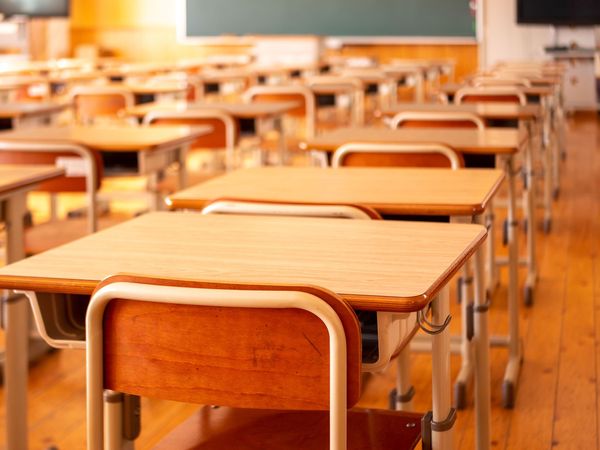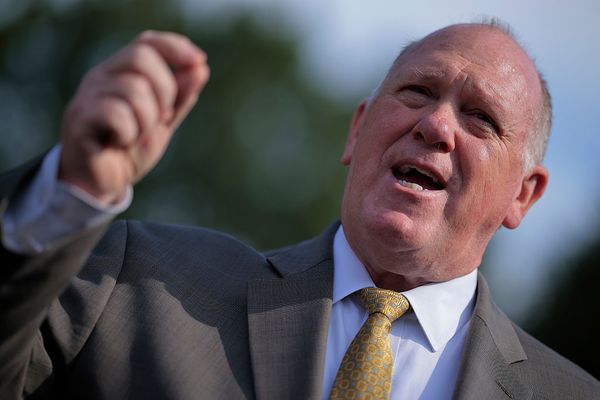
Chrome-front grilles and flared exhausts gleam in the autumn sun at the hot rod exhibition, the painted panels shining, black japonica and scarlet red. Some of the men have dressed as greasers, orange and brown two-tone shirts and Brillo’ed quiffs, the women in print dresses, bright lipstick and flowers behind the ear. This is Ulverstone, northern Tasmania, at its small showground. Since the town itself has more than a touch of the 1970s, the trip back into the ’50s wasn’t such a shift.
Tammy Tyrrell, Jacqui Lambie’s Senate candidate, had been there earlier, I was told, but she’d gone now. Only the local paper, the Advocate, had the heads up, and all they’d done was take a photo. I cursed my luck. I’d skipped Ecofest nearby, and a Tasmanian Horticultural Society do that looked a tad genteel, but I’d dropped in on the carrot festival at nearby Frome on the off chance she’d pass through and bless the purple Eindhoven giants. I should have just staked out the hot rods. Not that it would have made getting an interview any more likely.
There have been low visibility campaigns before, but what Lambie and her advisers are running with Tammy Tyrrell is of another order entirely. This is a campaign in which someone who may have the balance of power in the Senate has been essentially entered into a witness protection program, a cipher who, by all accounts, isn’t even given much opportunity to speak to the actual punters, let alone the media. The pitch on Tyrrell’s Twitter is that she’s lived through the things politicians talk about:
So, implicitly, she doesn’t have to speak. She represents knowledge and being, fused, and her deliberations and voting will be the unmediated expression of the interests of the excluded, the marginalised.
Jacqui, they will say, was like this once too. Now look at her.
But from the moment she entered public consciousness as a Palmer United Party (PUP) candidate, no one was in any doubt about what Lambie’s opinions were. She hit the ground running and broke discipline even before the election concluded.
Much of what people still think about Lambie comes from those first few months, when the Senate echoed to an accent and to words not heard in the place for quite a while, with the exception of Pauline. Palmer’s other candidates were stooges; One Nation and the Liberal Democrats may have shared some of Lambie’s then-noxious views but they were professionals drawn from the same well as the political class, and cloaked them in the abstract language of government, not Lambie’s raw reaction to alleged Islamisation and crimewaves.
Her transformation since then has been one of the most extraordinary in the range of the “excluded” class populism that has arisen in the past decade across the West. To the eyes of many she has become heroic by that transformation; a prejudiced and wilfully ignorant right-wing populist, parroting the inanities of daytime talk shows, turned into a thoughtful champion for local rights who has managed to twin that with a new progressive attitude on refugees.
That is the Lambie we have now, the one who gets a profile in The Monthly painting her as a feisty woman, without much mention of her politics at all, or — on a TV set hovering above me as I got a haircut two days ago — on an SBS program, forehead daubed with the ceremonial markings of a First Nations people, talking country.
This is a Lambie that progressive people can like; everyone can agree that she “says what she thinks” and is “a real person”. But I’m not so sure that what has happened is wholly or even at all good.
A new low point
It seems to me to mark a new point in the separation of the excluded from the field of politics, a mediation whereby even the populists now represent the progressives back to themselves, their priorities standing for the demands of the angry and excluded people who initially put her there.
In that respect it would appear to be the final trick of the system against the sprawling world beneath it, the last step by which working people become “the party of no part”, those with no existence at all in the political system that rules, defines and produces them afresh.
Part of Jacqui Lambie’s journey over the past decade has been her struggle to be free of the forces that surrounded her when she suddenly appeared on the national stage as a member of the PUP. Palmer basically assigned her Rob Messenger, an old Liberal consigliere, as a chief-of-staff/minder, to keep her firmly within the right-wing populist camp. Given what we came to know of Lambie, it’s clear in retrospect that her tenure in Palmer’s “party” was never going to last long.
But the Senate initially utterly bewildered and overwhelmed her, for all her bluster about it. By her own admission, she was drinking too much at the time, mouthing off randomly — joining the confected panic about “sharia law”, and then failing to learn even the basics of it — and doing the rounds of breakfast FM, talking about the anatomical requirements of any potential new boyfriend.
She kept Messenger on (or couldn’t cut him loose) and her politics remained right-wing tabloid, but with personal exceptions: crack down on dole bludgers and criminals, but support veterans on disability payments, and those, like her son (and herself) who had fallen prey to substance addiction. All the while, she claimed to be fighting for forgotten Tasmanians, those in the north in particular, who were getting a rotten deal on health, education and, more recently, housing.
Getting out of the Liberal ghetto was a long time coming. Messenger was still in place in 2018 when Lambie, booted from the Senate on a Section 44 challenge, ran a full ticket in the Tasmanian state election, but not including herself.
Had she run in Braddon, the fifth seat would have been hers to lose, and she might have got someone up in Bass or Franklin. But she stayed out, and her mixed crew of lost people, chancers and an old Liberal hack or two got nowhere. It was either the worst campaign in modern memory, or thrown, to allow the Liberals to get 13 seats of 23 and govern in their own right. One year later, Lambie gained Liberal preferences for her new Senate tilt, in a crowded field, and got over the line for the sixth seat, on their surplus votes.
Reality starlet
In the meantime, Lambie herself had changed somewhat. Messenger went when she lost power, and she had thrown herself into a round of reality TV appearances to maintain visibility, including the SBS refugee-reality switch show Go Back to Where You Came From. This proved the occasion for a switch — public or real or both — of her attitudes on a range of social issues.
In this period, she began to staff herself from the left-leaning Australia Institute and Grattan Institute. The Australia Institute had made cross-contact with Clive Palmer when his crazy circus had been elected in 2013. Its new leaders Ben Oquist and Richard Denniss were interested in making audacious deals — more so than Institute founder Clive Hamilton — and Palmer proved a willing partner.
When Lambie herself took over the Australia Institute link, something very strange happened. Her politics and her office certainly got more purposeful and organised.
She got the veterans royal commission up, and a better housing deal for Tasmania. But the latter came at a big cost — voting up $158 billion in Liberal tax cuts to higher earners — and the gains are disputed.
Her supporters say she was instrumental in the state government’s new extended spend on housing, to the tune of hundreds of millions over a decade. Her detractors say that all she achieved was a write-off of the state’s federal housing debt of $150 million — freeing up a mere $15 million in interest — which should have been the first, preliminary move of a much better deal.
There hasn’t been a lot else that’s visible, no big public education or health deal, though she intervenes on many small things. To be fair, she’s fought for TAFE funding, and against the jacking up of uni fees, for mental health, and preventative intervention.
And then came the refugee deal, in which she appeared to back the Medivac abolition, but was then revealed to have done so to get the New Zealand transfer through. A strange moment, drawing lots of political capital and seeming to put refugees, the progressives’ subject of history, at the centre of her politics, supplanting those closer to home.
This small event, in a small polity, seems to me to be of significance. For it indicates that the gravitational force of the system, run by the twin elites of progressivism and corporate power, is so strong that even a (mostly) non-toxic populist will be drawn into it not through financial corruption but through the system’s self-sustaining ability to reproduce. In the process, the excluded, who may have briefly gained a voice, are doubly excluded, since even their representative is now de facto excluding them.
This transformation appears to have had an effect on Lambie’s base, as far as I can tell from a hundred or so vox pops in northern Tasmania. Support and former support would appear to have cracked into two neat halves. There are those who say “I love her, she says what she thinks!” and “she got that housing debt knocked off!” on the one side — the housing debt appears to be the one initiative that sticks in people’s minds — and on the other side those who say “I used to like her, but Jacqui’s out for Jacqui now” or “she’s only for her stuff. There are other people apart from veterans” and “she votes with the Greens too often”. Not a hugely accurate view, this last one, but I suspect it stands as a general view on her new progressive enthusiasms.
Populism 2022
Quite possibly, populism in our era will always be drawn back into the system, because it arises from it, from the media swirl generated to separate people from recognising their interests. Lambie’s homeland, in a way, is not the real piecemeal Tasmania, the carrot festivals and Scout jamborees, but the reality TV fantasia she, by her account, lived in, while spending nine years on the sofa, a victim of drug and alcohol addiction arising from shockingly bad treatment of injuries acquired during military service.
A slight excess of narcissism is probably a necessary prerequisite for a populist these days, and a successful one is she who can manage and channel it to effectiveness. The lower political ranks of these parties is filled with people who can’t, hopeless delusionists.
Some will say Lambie knows what she’s doing.
She has become adept at small deals and lobbying — “Jacqui’s office said they were working behind the scenes” someone told me about a benefits horror story they’d taken to her (they didn’t sound too pleased with that way of doing it). But is that really what she was elected for?
Senators represent a whole state, but they don’t really. They represent an interest within it, and a view about best interests. How is it that on housing, she can tell SBS it needs to be investigated? It’s been investigated. Get more money to build more if negative gearing and limiting Airbnb is proving impossible.
How is it that the state’s health-system crisis — as bad as Australian rural health in general, as state health activist Tim McCarthy reminded me, but occupying a whole island — has had no significant heat applied to it over the three years of Lambie’s second tenure? Populists here shouldn’t be prioritising progressive close-heart causes and, really, shouldn’t be bound up with the Australia Institute.
They should be organising protests outside hospitals and occupying Treasury offices, to demand change in a system that has thrown working people on the scrapheap to die a decade younger than mainlanders in some groupings after a decade or more of under-treated chronic illness. Then they should be blackmailing government for money — big money — in exchange for their support.
If genuinely representing these people involves the manifesting of some values that progressives hate, such as a residual nativism, a relative indifference to the refugee plight or anti-Green views, then so be it. That doesn’t mean getting sucked into the culture wars. It means moving the material interests of the excluded to the front and centre of your politics.
Arguably Lambie should have dropped down to the state level, taken the balance of power, and blackmailed both parties wanting power to increase the tax take on pokies and mining, deficit budget instead of surplus austerity budget and then put half a billion into state health, housing and education. There would have been risks in that, but we’ll never know. The moment passed.
The thing has become its opposite. Tammy Tyrrell, should she make the Senate, will be elevated not as a political subject but as an object, silent and symbolic, devised by a confluence of forces to further a bit of a political racket (Tyrrell may well then rebel, i.e. “do a Jacqui” on Jacqui).
Moving among the beetroot festivals and church fêtes of this beautiful place, of a living culture, Tyrrell is nevertheless an artefact, placed where actual politics should be. Which raises the question: is representation of the excluded now possible at all in anything we’ve come to know of politics?
Or has it become an endless precession of the simulacra, as retro as hot rod hipsters dancing to “Greased Lightning” on a Sunday afternoon in a country showground, while all the metal gleams around them?







